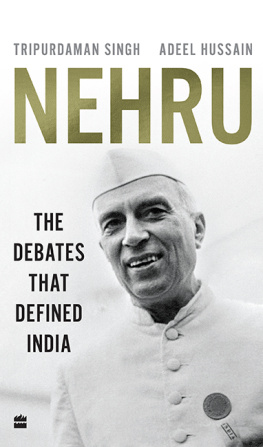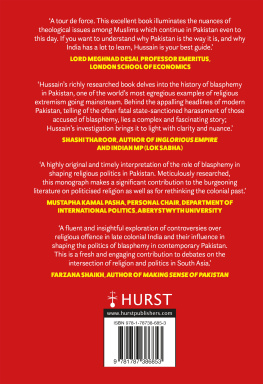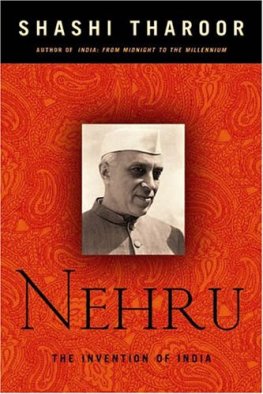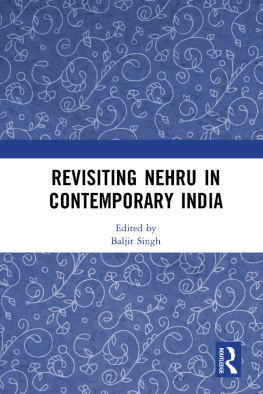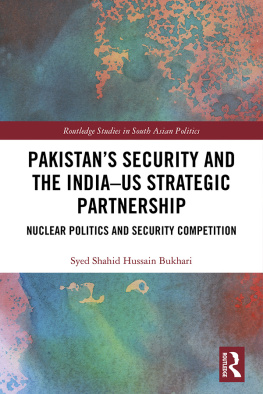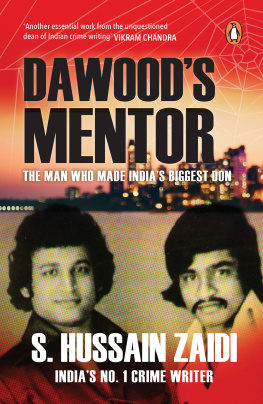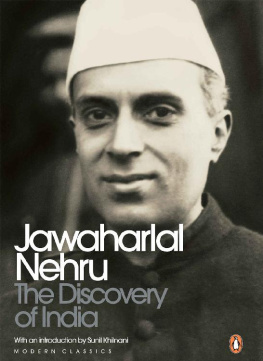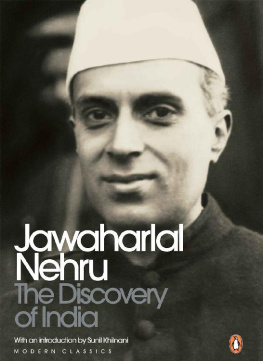Adeel Hussain - Nehru: The Debates that Defined India
Here you can read online Adeel Hussain - Nehru: The Debates that Defined India full text of the book (entire story) in english for free. Download pdf and epub, get meaning, cover and reviews about this ebook. year: 2021, publisher: Fourth Estate India, genre: Politics. Description of the work, (preface) as well as reviews are available. Best literature library LitArk.com created for fans of good reading and offers a wide selection of genres:
Romance novel
Science fiction
Adventure
Detective
Science
History
Home and family
Prose
Art
Politics
Computer
Non-fiction
Religion
Business
Children
Humor
Choose a favorite category and find really read worthwhile books. Enjoy immersion in the world of imagination, feel the emotions of the characters or learn something new for yourself, make an fascinating discovery.
- Book:Nehru: The Debates that Defined India
- Author:
- Publisher:Fourth Estate India
- Genre:
- Year:2021
- Rating:5 / 5
- Favourites:Add to favourites
- Your mark:
- 100
- 1
- 2
- 3
- 4
- 5
Nehru: The Debates that Defined India: summary, description and annotation
We offer to read an annotation, description, summary or preface (depends on what the author of the book "Nehru: The Debates that Defined India" wrote himself). If you haven't found the necessary information about the book — write in the comments, we will try to find it.
Nehru: The Debates that Defined India — read online for free the complete book (whole text) full work
Below is the text of the book, divided by pages. System saving the place of the last page read, allows you to conveniently read the book "Nehru: The Debates that Defined India" online for free, without having to search again every time where you left off. Put a bookmark, and you can go to the page where you finished reading at any time.
Font size:
Interval:
Bookmark:


To our parents
Contents

J AWAHARLAL NEHRU HAS loomed like a colossus
Nearly six decades after his passing, Nehru continues to make the newspapers with surprising regularity, not only in the context of the past but also in the context of the present. Deified and vilified in equal measure, he retains his centrality to political discourse, often cast as a player in current-day debates. In May 2021, for example, as India reeled from a ferocious second wave of Covid-19, furious commentators invoked Nehru to fulminate against the governments response. How Jawaharlal Nehru would have dealt with the Covid-19 pandemic in India, ran one scathing headline in the newspaper Gulf News. With the benefit of hindsight, we might add a postscript: in India, Nehru forms an inseparable part of any age. Even today, Nehrus ideas constitute the centre ground in Indian politics and the ideological spectrum is defined by degrees of divergence from them.
Before he came to enjoy this hegemonic power, however, this was not the case; and before his ideas enjoyed the status of received wisdom, they were fiercely contested. Sharing the stage with political and intellectual figures who considered themselves his equals and peers, if not competitors, Nehru had to pit himself vigorously against them in the public realm. In this marketplace of ideas, he had to fend off not only political opponents like Mohammad Ali Jinnah of the All-India Muslim League and Syama Prasad Mookerjee of the Hindu Mahasabha, but also colleagues like the Congress leader Sardar Patel, with whom he often disagreed.
This was a challenge that Nehru took up with gusto. Engaging with them, arguing with them, debating with them and attempting to manipulate them, Nehru fought for his corner, clarifying and structuring his own ideas in the process. In this intellectual combat, he did not even spare Mahatma Gandhi, although he shied away from open confrontation with his mentor. As Gandhi once described to the Viceroy, Lord Linlithgow, after debating his protg over the Quit India Movement, Nehru had the capacity to argue for days together with a passion that I [Gandhi] have no words to describe.
Some of the most profound questions in South Asian history were debated this way, many of which continue to remain unresolved, bedevilling the contemporary world as intensely as they did Nehrus for example, questions about Muslim representation, about the role of religion in public life, the sanctity and inviolability of Fundamental Rights, or Indias relations with Pakistan and China. Through such sparring often conducted directly and openly via speeches, correspondence and articles ideological disagreements were voiced, political allegiances were forged and public opinion was moulded. These hugely consequential debates decisively influenced political events, generating enduring repercussions.
Nehrus contests were always over ideas, never any personal interests of his own, argued Crocker (and other biographers), though he waged them without quarter and provoked a good deal of personal enmity. This is, of course, not strictly true, because there was often more than a tinge of instrumental rationality about many of these contests especially when Nehru contested the views of his peers. The ways he waged these conflicts, the tools that he deployed and the reasoning he provided marked each such contest as a part of Nehrus manoeuvring for short-term gain and acquiring and consolidating political power; they expressed his tactical and strategic side as much as they did the visionary and the ideational. Engaging in these contests, Nehru and his contemporaries delineated their ideological positions, offered competing visions and configurations for the future, and staked out the political terrain with consequences that reverberate to this day.
This book shines a spotlight on four such consequential debates that Nehru engaged in: with the poet-philosopher Muhammad Iqbal, with the Muslim League leader and the founder of Pakistan Mohammad Ali Jinnah, with his colleague and deputy Sardar Vallabhbhai Patel and with his first counterfoil in Parliament, Syama Prasad Mookerjee. With Jinnah, Nehru exchanged rancorous letters on Hindu-Muslim relations and the demands of the Muslim League. With Iqbal, he contested the meaning of Muslim solidarity, and the role of religion and religious orthodoxy in public life. Patel and Nehru crossed swords over Indias policy towards China and Tibet. And with Mookerjee, Nehru clashed in Parliament over civil liberties and the First Amendment to the Constitution. All four debates represent critical junctures in South Asian history, moments that decided which way the pendulum of events would swing. Each debate is thus a crucial part of the events that followed: unbeknownst to them, for example, Nehru and Jinnahs arguments were the opening act of Partition, in the same way as Patels confrontation with Nehru contained the seeds of 1962.
Nehrus political career was rooted in a vision of a new India, stated Judith Brown, one of Nehrus biographers, [and] appreciating the origins and power of this vision is essential for an understanding of the man. This is indeed true, as almost all his biographers have noted. Nevertheless, it is also true that translating this vision into policy meant leaving the world of visions and interacting with the more mundane world of politics, where arguments and alternatives put forward by his contemporaries had to be disarmed (or often dismissed), opponents confronted and outmanoeuvred, compromises struck, choices made, events responded to and, more importantly, Nehrus own grip on political power enhanced.
It is equally true that Nehrus personality, complex and contradictory in equal measure, heavily influenced his politics. Combining hard work, charm, idealism and ruthlessness with vanity, petulance and frequent (and famous) outbursts of temper, Nehrus predilections and prejudices, his likes and dislikes, had a great bearing on his relationships with his contemporaries, and his engagement with their ideas. Nehrus political career was rooted not only in his vision, but also in the exigencies of practical politics and the personal relationships he shared an aspect of his politics that admirers tend to play down as much as detractors like to play up.
In this setting, engagement with other political actors was as instrumental as it was ideational, and as personal as it was public. If Nehru the visionary was an idealist, then Nehru the political actor was as much a hard-nosed realist. Nehrus vision is part of the story; so is the intersection of his vision with the wider political world he operated in. Nehrus writings and public utterances accordingly have to be seen in this light as tools of both intellectual and strategic engagement with other political actors, and as a method of positioning himself in and navigating through the fraught politics of the pre-Nehruana years. Appreciating the origins and power of Nehrus vision of India which, as Brown contends, is essential for an understanding of the man thus must be complemented by an appreciation for, and an understanding of, how that vision emerged at the intersection of Nehrus ideas, the ideas of his contemporaries, the vagaries of practical politics and the foibles of Nehrus own personality. Examining his debates enables us to do this.
Reproduced here in their original form, along with introductions that provide the historical contextualization and intellectual scaffolding needed to understand them in their entirety, the four debates between Nehru and his contemporaries together provide an intimate insight into the man and his ideas as they took shape in the crucible of politics, squared up to the ideas of opponents and colleagues alike, and demarcated their position in the public realm. They give us a first-hand glimpse of Nehru in action, giving us an incisive view into the process through which his ideas came to triumph over those of his contemporaries and allowing a more composite picture of Nehru to emerge.
Font size:
Interval:
Bookmark:
Similar books «Nehru: The Debates that Defined India»
Look at similar books to Nehru: The Debates that Defined India. We have selected literature similar in name and meaning in the hope of providing readers with more options to find new, interesting, not yet read works.
Discussion, reviews of the book Nehru: The Debates that Defined India and just readers' own opinions. Leave your comments, write what you think about the work, its meaning or the main characters. Specify what exactly you liked and what you didn't like, and why you think so.

